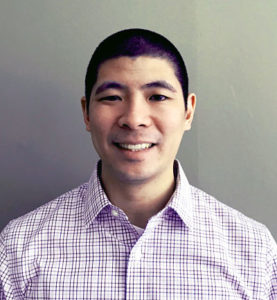Innovation, Care and Support
 March Ang is the educational coordinator for the Dearborn STEP assessment program, providing intensive clinical, therapeutic assessment to students in Grades 5-12 for up to 40 school days. When you ask him why he enjoys his work, his answer is immediate, “I like the students. It’s just fun working with them.
March Ang is the educational coordinator for the Dearborn STEP assessment program, providing intensive clinical, therapeutic assessment to students in Grades 5-12 for up to 40 school days. When you ask him why he enjoys his work, his answer is immediate, “I like the students. It’s just fun working with them.
“Forty-day assessment is a different kind of place where you get to see a lot of the students and make a lot of connections, which I really enjoy. I like working with the teachers also, teaching what I understand and working together to create new ways of teaching students and assessing them.”
According to March, with STEP assessment, every student is a specific challenge. The staff works to understand who each student is as a human being in a way that the teachers and clinicians can capture and translate for the people who will ultimately work with the students at school.
“That’s exciting,” March explains. “I like solving puzzles, and every student is like a puzzle. We are trying to figure out what’s going on with them – what their strengths are, how we can help them best and how school can help them best. That’s just fun to do.”
March shares that he also enjoys the writing aspect of the work at STEP. The program provides very detailed assessments of students’ academic, social and emotional progress each week to families and school district staff. Before embarking on a career in education, March earned a degree in journalism. He was writing part time when a friend who was working at Dearborn Academy approached him about a position at the therapeutic day school as an assistant teacher.
He decided to apply for the position and was accepted. “It seemed pretty clear to me, as soon as I stepped in the door, that this was something that I wanted to be a part of.”
Later, a temporary lead teacher position came open when a faculty member went on maternity leave. March transitioned to STEP soon after and fell in love all over again.
“STEP is such a unique place. The process is so different.” The program lends itself to “inventiveness” in keeping students engaged while still assessing them.
After a few years, March assumed the role of the newly-created educational coordinator position. He still works with students but primarily works with teachers and oversees testing and the writing process. It is rewarding to know that he can have a greater impact in his current role.
Be There for the Student
When you ask March who can be successful in the field of special education, he tells you that the field needs people who focus on where a student is academically, socially and emotionally when they come into a school or program. They need to ask themselves how they can best help a student while understanding that this is the student’s journey to take.
It is always about the student and not them, as the teacher. It is a mistake for a teacher to measure a student’s successes as a mirror to their own ability. “If you are going to do this line of work,” March says, explaining that this is something most teachers learn over time, “be as introspective as possible about what you are hoping to learn, ask what your goal is, and be honest with yourself. If you are really here for the students, that’s great. If there are other things that you are looking for, it’s going to be harder.”
“It’s awesome to see how far students grow here – once they are seen a little more,” explains March. The program’s staff/student ratio of 1:2 and strength-based, student-centered approach ensures that STEP’s educational services are individualized and based on student need.
Additionally, clinicians and other milieu staff are part of the students’ classroom experience, ensuring that each student has the opportunity to use what they have learned in the clinical setting in real-time. An onsite psychiatrist is available weekly to provide psychiatric consultation and supports.
This combination of supports helps students understand that STEP puts them at the center of their educational journey. “Every student deserves the level of attention that STEP is able to give them. The greatest thing is when we hear back from students – when they come back three or four years later and tell us that without STEP they don’t know where they would be.”
Hearing from students that STEP was the turning point in their academic career and knowing the kind of impact the program has is what keeps March Ang motivated. Working with the rest of the leadership team and staff, March is focused on ways to keep STEP’s mix of innovation and caring support constantly evolving.
